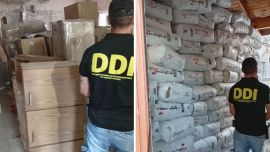Argentina recorded more than 400 deaths for the fourth time in five days on Friday, as the country’s Covid-19 death toll exceeded 15,000.
Health Ministry officials confirmed yesterday evening that 443 deaths had been registered by officials over the past 24 hours, rounding off an awful week for Argentina. That figure came in the wake of 429 fatalities on Monday, 470 on Tuesday, 424 on Wednesday and 390 on Thursday. Before this week, Argentina hadn’t posted a single day with more than 400 deaths in the previous 24 hours.
The repeated breaking of records this week sparked concern among citizens and healthcare professionals alike. Officials and experts, however, said that some of the fatalities registered this week dated back more than a month.
It remained unclear at press time exactly how many deaths were not from the preceding 24 hours.
The apparent delay in the loading of data of deceased individuals has created criticism from experts, who say it is misrepresenting the current state of affairs. They concede, however, that this is not just a problem that affects Argentina.
Adding to the confusion, the Buenos Aires Province government said that it had "recategorised" and unified data on coronavirus mortality to avoid "under-reporting." Provincial Health Minister Daniel Gollán said as a result that the region's death toll had risen from 8,983 deaths to 12,566 – a jump of more than 3,500 fatalities.
"The delay in the loading of data in a pandemic is something worldwide. Not only from here,” he said at a press conference.
On Friday, officials also confirmed 12,989 new cases nationwide, lifting the total number of infected since the start of the pandemic to 691,235. Thursday saw Argentina overtake South Africa to move into ninth place in the world for confirmed cases.
“Argentina is going through a very difficult situation,” Dr. Marcos Espinal, the director of communicable diseases at the Pan American Health Organisation, said in a webcast this week. “And we can’t say they’ve yet reached a peak.”
The Health Ministry said Friday that 3,595 people are currently hospitalised in intensive care units (ICUs) across the country, with ICU bed occupancy at 61.7 percent across the country, rising to 66.2 percent in the Buenos Aires metropolitan area (AMBA).
Amid a surge in infections in inland provinces, some regions have switched to the strictest phase of lockdown possible, including Mendoza and Salta Provinces.
President Alberto Fernández's government imposed lockdown restrictions on nearly all activities on March 20, but since then quarantine measures have been relaxed, mostly on a province-by-province basis. Schools and universities remain closed and large social gatherings, concerts and performances are still prohibited.
Buenos Aires Province remains the most affected region, followed by Buenos Aires City, and the provinces of Santa Fe Province, Córdoba and Mendoza.
Despite officials continuing to witness high daily numbers of infections and fatalities, officials are discussing whether to relax lockdown measures further after October 11, when the current quarantine period ends. In recent weeks, healthcare professionals have called for tighter rules and for citizens to take greater individual responsibility, though protests against the government and its lockdown restrictions have been taking place on a semi-regular basis.
– TIMES/NA





















Comments